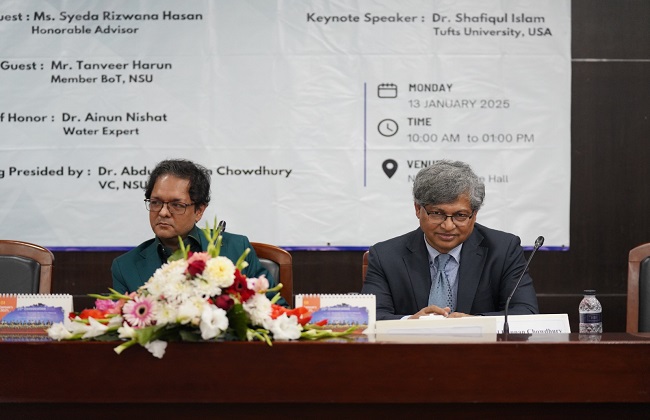
The Centre for Infrastructure Research and Services (CIRS) at North South University (NSU) organized an international seminar titled “Breaking the Ice: Dialogue on Transboundary Water Sharing between Bangladesh and India.” The seminar was held on January 13, in a hybrid format—both in person at the NSU Syndicate Hall and online.
The seminar was presided over by Professor Dr. Abdul Hannan Chowdhury, Vice-Chancellor of NSU. The panel of distinguished guests included Ms. Syeda Rizwana Hasan, Honorable Advisor, as the Chief Guest; Mr. Tanveer Harun, Member of the Board of Trustees, NSU, as the Special Guest; and Dr. Ainun Nishat, a renowned water expert, as the Guest of Honor.
The event was attended by a distinguished audience comprising scholars, faculty members, policymakers, and a select group of students.
The seminar was inaugurated by Dr. Md. Sirajul Islam, Professor of the Department of Civil and Environmental Engineering (CEE), NSU, who welcomed everyone and set the stage for the discussions.
The keynote speaker, Dr. Shafiul Islam, a distinguished professor at Tufts University and founding director of the Water Diplomacy Program, emphasized the importance of synthesizing scientific and social factors into pragmatic, actionable solutions. He also highlighted the need to diagnose water-sharing issues through a combination of narratives and numerical data.
Dr. Nazrul Islam, a distinguished economist and Chief of Development Research at the United Nations, gave a special presentation. He advocated adapting the natural philosophy of rivers and signing the UN Convention on the Law of the Non-Navigational Uses of International Watercourses as a pathway to resolve transboundary water-sharing disputes.
Dr. Monirul Qader Mirza, Transboundary Water Researcher presented examples of successful water treaties worldwide that could serve as models for India and Bangladesh. He proposed key action items such as adaptive water-sharing mechanisms, enhanced data sharing, and prioritizing sustainable resource management.
Dr. Mohammad Abdul A. Hossen, a Member of the Joint River Commission, shared insights from his Ph.D. research, outlining the successes and failures of water treaties globally. Meanwhile, Dr. Sabbir Hossain, Professor of WRE at BUET, emphasized the critical role of real-time data sharing in facilitating engineering diplomacy.
Other discussants, including Eng. Fida A. Khan, Ambassador Shahidul Haque, and Dr. Mehebub Sahana, underscored the importance of ecological needs, multilateral dialogues, and resource availability as vital components for resolving water-sharing conflicts.
Mr. Tanveer Harun, Member of BOT, NSU encouraged more research on policy-making and urged students to engage actively in such initiatives. He said that the issues surrounding the transboundary rivers affected the livelihoods of farmers and even threatened the survival of many people. He emphasized the need to formalize treaties, saying that it would still take years of planning and exercising democracy to negotiate fair deals.
In his closing remarks, Professor Dr. Abdul Hannan Chowdhury, Vice-Chancellor of NSU emphasized the critical need for close monitoring and collaboration between Bangladesh and India to address the pressing issue of transboundary water sharing, calling it “the most pressing issue between India and Bangladesh at the moment.” He expressed optimism for the future, stating his belief that while the current generation may not fully resolve these challenges, the present student body and future generations would rise to the occasion and find lasting solutions.
Professor Dr. Shazzad Hosain, Dean of the School of Engineering and Physical Sciences, delivered the vote of thanks, expressing gratitude to the distinguished guests, speakers, and participants for their valuable contributions to the seminar.

